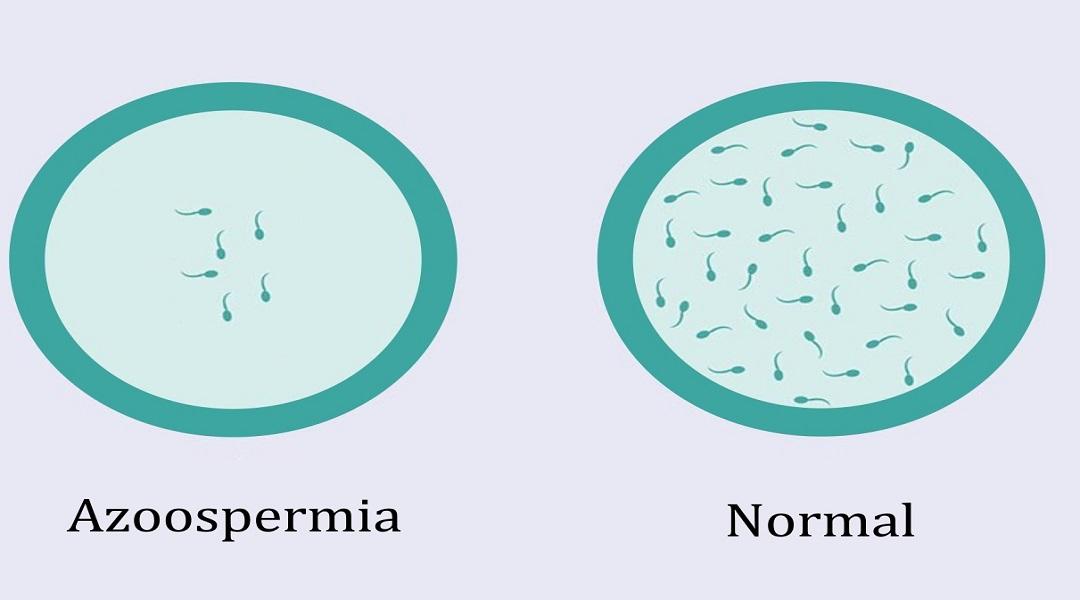What is Azoospermia?
The azoospermia is a sperm abnormality characterized by the total absence of sperm in the ejaculate. It obviously leads to infertility in men, because in the absence of sperm there can be no fertilization. However, Dawasanté experts provide you with a natural herbal treatment to improve the quality and quantity of your sperm. Click here or on the image below to discover this natural treatment.
We deliver all over the world.
For more information, you can contact our experts on +229 51374202 direct line or by WhatsApp at the same number.

Azoospermia affects less than 1% of men in the general population or 5 to 15% of infertile men (1).
The causes
Depending on the cause, there are two types of azoospermia:
Secretory azoospermia (or NOA, for non-obstructive azoospermia)
Spermatogenesis is impaired or absent and the testes do not produce sperm. The cause of this spermatogenesis defect can be:
- hormonal, with hypogonadism (absence or abnormality in the secretion of sex hormones) which may be congenital (Kallmann-Morsier syndrome for example) or acquired, due in particular to pituitary tumors which alter the functioning of the hypothalamic-pituitary axis or after a treatment (eg chemotherapy);
- genetics: Klinefelter syndrome (presence of an extra X chromosome), which affects 1 in 1,200 men (2), structural abnormality of chromosomes, (microdeletion, i.e. loss of a fragment, of the Y chromosome in particular), translocation (one segment of the chromosome detaches and attaches to another). These chromosomal abnormalities are the cause of 5.8% of male infertility problems (3);
- bilateral cryptorchidism: the two testes have not descended into the bursa, which impairs the process of spermatogenesis;
- infection: prostatitis, orchitis.
Obstructive or excretory azoospermia (OA, obstructive azoospermia)
The testes do indeed produce sperm but they cannot be exteriorized due to a blockage of the ducts (epididymis, vas deferens or ejaculatory ducts). The cause may be of origin:
- congenital: the seminal tract has been altered from embryogenesis, resulting in an absence of the vas deferens. In men with cystic fibrosis, a mutation in the CFTR gene can cause the absence of vas deferens;
- infectious: the passages have been blocked following an infection (epididymitis, prostato-vesiculitis, prostatic utricle).
1-Pre-testicular causes
In this case, the origin of azoospermia is due to alterations at the endocrine level, that is, it is manifested by irregularities in the levels of the hormones responsible for regulating sperm production or spermatogenesis. . These are therefore cases of secretory azoospermia.
Among the main endocrine disorders that can cause azoospermia, we can find:
- Hypogonadotropic hypogonadism: this is a deficiency of the hormones released by the pituitary gland and responsible for stimulating the production of sperm in the testes. The main hormones are FSH (follicular stimulation) and LH (luteinizing). This problem can be due to genetic alterations such as Kallmann syndrome, tumors, trauma, pharmacological treatments, consumption of anabolic agents, etc.
- Hyperprolactinemia: it is the excessive increase in the hormone prolactin release. It blocks the hormone GnRH (a hormone that releases gonadotropins), whose function is to regulate the release of FSH and LH. This can be due to the consumption of antihypertensive drugs, stress, tumors, antidepressants, etc.
- Androgen insensitivity syndrome: this is mainly due to genetic mutations that cause resistance to androgens so that full virilization of the patient does not take place. Depending on the degree of severity, testosterone levels can be low, which prevents or hinders spermatogenesis, among other related consequences.
Patients who suffer from azoospermia due to this syndrome will have slightly decreased testicular volume, they will not produce sperm in the testes, and their FSH levels will generally below, except in cases of androgen resistance. In this case, the LH is elevated but the FSH and testosterone concentrations are usually normal or slightly elevated.
Testicular causes
The absence of sperm is due to problems in the testis which hamper spermatogenesis and therefore lead to errors or even blockage of sperm production.
The most common testicular pathologies are:
- Varicocele: dilation of the spermatic veins.
- Cryptorchidism: no descent of the testis from the inguinal canal to the scrotal pocket.
- Orchitis: Inflammation of the testicle, usually due to infection, as is often the case with mumps.
- Genetic alterations
- Testicular torsion
- Trauma
- Continuous increase in testicular temperature
The type of azoospermia from which these patients suffer is also secretory, but the clinical picture is different from the previous one: they have a lower testicular volume (due to non-production of sperm) but the FSH levels are high.
FSH, which is responsible for stimulating the testes to produce sperm, increases. This is why the testes do not respond to their stimulus, the body sends more FSH for the testes to function.
Post-testicular causes
When the cause of azoospermia is post-testicular, it is obstructive azoospermia. In this case, the testes are able to produce sperm properly, but there is a problem in the seminal ducts (vas deferens, epididymis or urethra) responsible for transporting sperm in an ejaculation.
Among these problems, we can highlight:
- Absence of vas deferens: this is a congenital pathology which, if it affects bilaterally, prevents sperm from coming out during ejaculate. This happens, for example, in some cases of cystic fibrosis.
- Obstruction of the vas deferens, the epididymis, or the urethra: it may be involuntary (trauma, surgery or disease) or voluntary. This is called a vasectomy.
Patients have a normal testicular size and FSH hormone levels are also average. Obstructive azoospermia is the least serious compared to fertility. It allows the man to obtain a pregnancy, either naturally, by a medical intervention which makes it possible to unblock the channels, or by obtaining sperm directly from the testicle and the subsequent application of a medically assisted procreation technique.
Your frequently asked questions
Is varicocele a cause of infertility in men?
By Victoria Moliner (embryologist).
Yes, varicocele can be a cause of male infertility. This pathology can manifest itself in different degrees of affection, so its harmful effect on male fertility (which mainly causes seminal and hormonal changes) can also be from mild to severe.
Is hormonal azoospermia always secretory?
By Andrea Rodrigo (embryologist).
Yes, when the lack of sperm is caused by hormonal problems, it is secretory azoospermia because of the lack of regulation by hormones prevents or complicates spermatogenesis.
Can cycling be the cause of my testicular factor azoospermia?
By Andrea Rodrigo (embryologist).
Continued use of the bicycle does not necessarily cause azoospermia, provided that the correct position is taken on the bicycle and, in some cases, certain testicular protection systems are used.
Routine improper use of the bicycle can increase the temperature of the scrotal region and thus prevent the proper production of sperm, which can reduce the quality of sperm.
As an added note, it is important to note that excessive exercise can affect sperm production in addition to other bodily functions.
Is azoospermia reversible?
By Andrea Rodrigo (embryologist).
It is possible that azoospermia is transient or punctual and, therefore, we can speak of reversible azoospermia. This means that, although it is unusual, a man may have a certain period of azoospermia, for example, due to stress or some other situation, and after this period recover the production of sperm and, with it, the presence of these in the ejaculate.
Read more
Why is there an absence of sperm in the spermogram?
By Zaira Salvador (embryologist).
When a man gets zero sperm as a result of his semen analysis, he may have azoospermia. First of all, this diagnosis should always be confirmed by a second spermogram, in case an error may have occurred while handling the first sample.
If azoospermia is confirmed, there are several causes of this seminal alteration, from blockage of the seminal ducts to problems with sperm production. More human testing should be done to find a more complete diagnosis.
We deliver all over the world.
For more information, you can contact our experts on +229 51374202 direct line or by WhatsApp at the same number.

